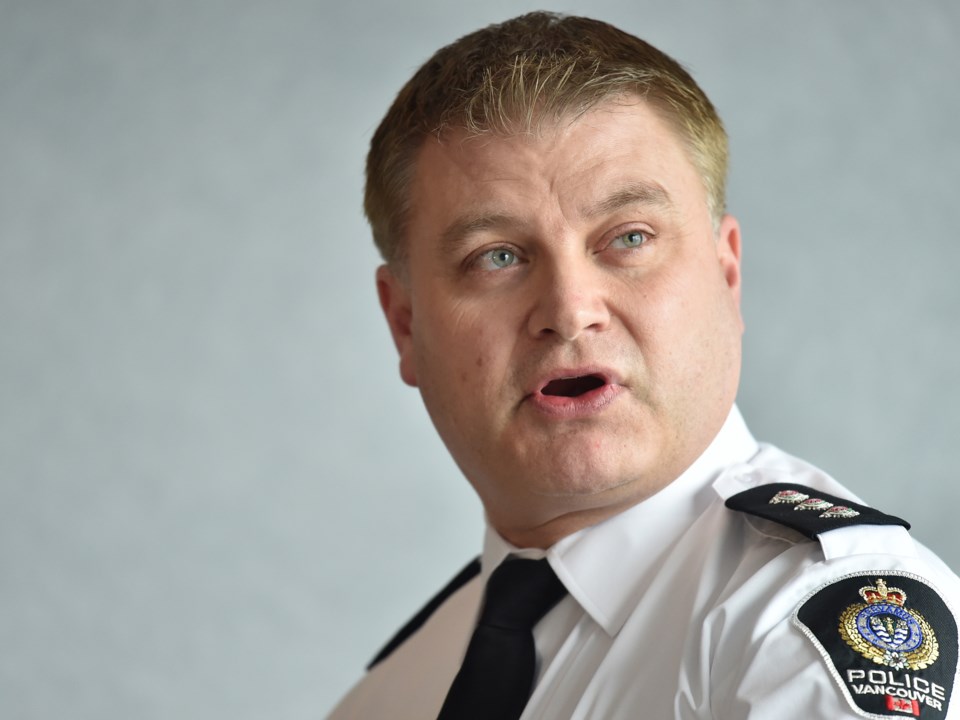When I’m not searching for the truth, or driving my sports-crazy kids around the Lower Mainland -- or deciding whether my tea of the day should be “super green matcha” or turmeric and ginger – I sometimes impart my semi-mad journalism skills on Langara College students.
And sometimes, like last Thursday, those students join me on the job.
We attended a Vancouver Police Board meeting, where we heard Insp. Bill Spearn of the VPD’s major crime section tell us that overdose deaths in the city are still at a crisis level – at least 335 people are suspected of dying in 2017, with more than 80 per cent of the deaths connected to fentanyl.
We also heard police took more than eight kilograms of fentanyl off the street in recent investigations and used the overdose-reversing naloxone spray on 19 people last year. Spearn also noted six officers were treated for exposure to fentanyl, with two requiring naloxone.
After the meeting, the students got a chance to fire questions at Police Chief Adam Palmer and Mayor Gregor Robertson, who doubles as chairperson of the police board. Spearn also agreed to stick around after his presentation and be interviewed.
Thought you might be interested in some of the questions and answers, which I’ve condensed and edited.
In no particular order, here you go:
To Spearn: The provincial government will release its budget next month. What would you like to see coming Vancouver’s way?
Spearn: “I’d like to see a lot more treatment options available for people – a multitude of treatment options. Specifically, I’d like to see opioid replacement therapy. I’d like to see what’s occurring at the Crosstown Clinic [which offers medical-grade heroin and legal analgesic hydromorphone] on a much larger scale available throughout the province to people in all communities.”
To Robertson: Do you think decriminalizing drugs like they did in Portugal could mitigate the opioid crisis?
Robertson: “I certainly support major changes to drug policy to ensure that deadly drugs aren’t the norm. [Right now] people with addictions are using them and putting their lives at risk because they can’t access treatment or clean drugs while they’re on the road to recovery.”
To Palmer: Two board members – an oncology researcher, and a medical doctor -- noted the overdose statistics don’t reflect the overall devastation of the crisis. They pointed out there is no data on those people who survived an overdose, but may die later of complications related to the event – brain injury, respiratory problems. Those deaths are not recorded as an overdose. Why would getting that data be useful information?
Palmer: “I think it just highlights the seriousness of the crisis. If somebody is found deceased in their room or laneway, that’s clearly an overdose death. But those longer term effects, where somebody does take drugs – whatever kind of drugs they may be and they have lasting brain damage, they end up in hospital and then pass away days, weeks, months later – they may not be captured in the stats. That is a longer term issue and drain on the healthcare system, and really another side of that tragedy that hasn’t been reported on that much.”
To Palmer: Who are the people dying of drug overdoses?
Palmer: “There’s a mix of people and it’s affecting people from all walks of life. I think it’s sometimes characterized as a problem only in the Downtown Eastside, which is incorrect. We’re seeing people dying in neighbourhoods all across the city – people from all different age groups, from all different backgrounds.”
To Spearn: Why is the VPD not arresting people who are openly selling marijuana at Robson Square?
Spearn: “What’s occurring down there is illegal. It will never be legal, even with the new Cannabis Act. We prioritize our response to incidents based on public safety. We could take action at any time but unfortunately we’re in the middle of an opioid crisis, and people are dying from opioids. So that is our main focus right now.”
Note: Police have since made arrests at Robson Square.
Next week, the same crew of young journos will be at city hall. Prepare yourselves accordingly councillors.
@Howellings



